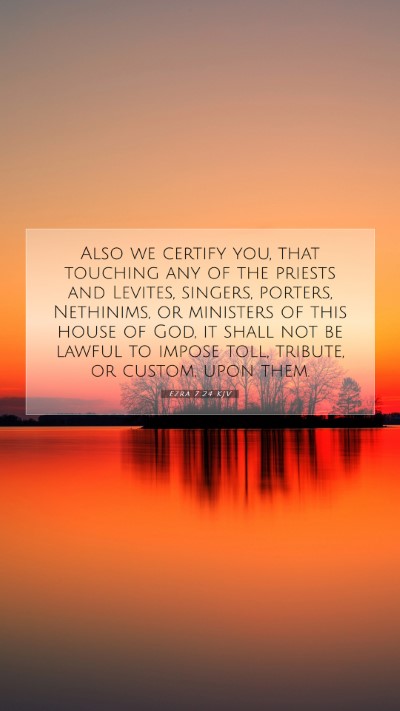Old Testament
Genesis Exodus Leviticus Numbers Deuteronomy Joshua Judges Ruth 1 Samuel 2 Samuel 1 Kings 2 Kings 1 Chronicles 2 Chronicles Ezra Nehemiah Esther Job Psalms Proverbs Ecclesiastes Song of Solomon Isaiah Jeremiah Lamentations Ezekiel Daniel Hosea Joel Amos Obadiah Jonah Micah Nahum Habakkuk Zephaniah Haggai Zechariah MalachiEzra 7:24 Meaning
What is the meaning of Ezra 7:24?
Also we certify you, that touching any of the priests and Levites, singers, porters, Nethinims, or ministers of this house of God, it shall not be lawful to impose toll, tribute, or custom, upon them.
Ezra 7:24 Bible Verse Meaning
Understanding Ezra 7:24
Ezra 7:24 states:
"Also we certify you, that touching any of the priests and Levites, singers, porters, Nethinims, or ministers of this house of God, it shall not be lawful to impose toll, tribute, or custom upon them."
This verse serves as an important statement regarding the financial and legal protections afforded to the religious leaders and servants of the temple in Jerusalem. Below, we explore the insights from notable public domain commentaries, shedding light on the meaning and implications of this verse.
Insights from Commentaries
Matthew Henry's Commentary
Matthew Henry emphasizes the significance of Ezra's decree in maintaining the dignity and functionality of temple operations. He notes that the priests and Levites were allowed to perform their duties without the burden of taxation, which reflects the priority of spiritual leadership in Israel. This exemption not only safeguarded their livelihoods but also underlined the need for their full dedication to their sacred responsibilities.
Albert Barnes' Notes
Albert Barnes highlights that this command was meant to protect the ministers of religion from external financial obstacles. He remarks that it was common during that time for religious leaders to be subjected to various forms of taxation, which could hinder their service. By granting this exemption, Ezra aimed to facilitate a thriving spiritual community, ensuring that the leaders could focus on guiding the people in their faith without financial distractions.
Adam Clarke's Commentary
Adam Clarke elaborates on the historical context of Ezra’s actions. He explains that after the Babylonian exile, it was crucial to re-establish the religious order within Jerusalem. Clarke points out that this decree not only protected the priests and Levites but also served as a statement of the government's support for the temple's role in society. He suggests that such provisions are pivotal for the health of any religious institution, allowing it to serve God and the community fully.
Broader Implications of Ezra 7:24
The implications of Ezra 7:24 extend beyond its immediate context. Here are several key takeaways:
- Importance of Religious Freedom: The verse underscores the significance of enabling religious leaders to operate without the constraints of worldly financial burdens.
- Support for Spiritual Leadership: It highlights the responsibility of both the community and the government to support those who provide spiritual guidance.
- Historical Context of Governance: This decree illuminates the relationship between religious and civil authority in ancient Israel, showcasing how leadership in faith was intertwined with governance.
Application of Ezra 7:24
For modern readers, Ezra 7:24 serves as a reminder of several principles:
- Valuing Spiritual Leaders: It is important to cherish and support those who minister in our communities, ensuring they can focus on their spiritual duties.
- Reassessing Financial Burdens: Reflecting on how financial obligations may affect participation in community faith activities can lead to healthier congregational dynamics.
- Encouraging Religious Autonomy: Recognizing the importance of allowing religious groups to operate independently from excessive regulation can foster a more vibrant spiritual life.
Related Cross References
For a deeper understanding of the themes in Ezra 7:24, the following verses provide additional context and insights:
- Nehemiah 10:32-33: Discusses similar financial and legal exemptions for the temple service.
- Malachi 3:10: Encourages support for the temple and its ministries through charitable acts.
- 1 Corinthians 9:14: Paul refers to the principle that those who preach should be supported by their congregation, drawing from the Old Testament.
Conclusion
The verse Ezra 7:24 exemplifies the intertwining of religious responsibility and social obligation in ancient Israel. By removing financial impediments for the temple servants, Ezra not only secured their ability to lead religious lives but also established a model for supporting spiritual leaders today. Understanding such passages helps in grasping their full meaning and application in contemporary contexts, making them relevant for personal study, group discussions, and various Bible study resources.
In conclusion, Ezra 7:24 is a rich source for exploring the interplay of faith and governance, reinforcing the need for communities to protect and support those who minister among them. In our quest for Bible verse meanings and interpretations, it reminds us of the enduring principles that govern spiritual life and leadership.


